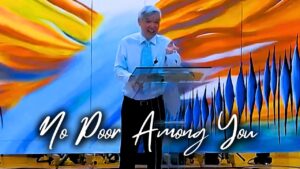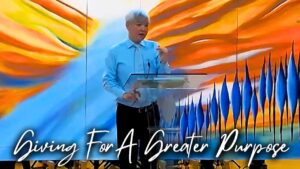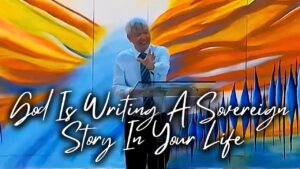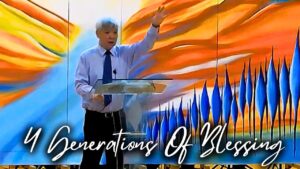Preached by: Bro. Fernand Peralta
1ST sERVICE
Evangel Tabernacle
Introduction
‘Tis the best of time. ‘Tis the worst of time.
– the first line in the novel A Tale of Two Cities by the famous English author Charles Dickens. It was written way back in 1859, but, come to think of it, 1859 seems only yesterday for this line still captures the reality of the age you and I are living in today.
Look around us. Is it really that bad to be human?…with all the “modern conveniences”–the perks of being human, made available to us? If people during the time of Gen. 11 (that’s after the Flood) could only time travel to the present, I believe we would hear them exclaim, “Now this is what we’re talking about. This is it…just the perfect time for that Tower of Babel Project. There’s no stopping us. Now let’s get on with that ‘tower…reach the heavens and make a name for ourselves…’” [what name would that be?—humans] Right, big words, but you all know how the story ends: The Lord came down, confused their language, and they were scattered over the face of the earth. [Scattered…now that’s a race.]
The human race [and that includes all of us here] after eons of years has populated and dominated the earth. All of a sudden, we are top of the food chain and we are in-charge of this and that. Then suddenly, it’s all about surviving, acquiring, maintaining, upgrading and living IT. The demands are so great that the World needs to keep up and upgrade its schemes; even the World System and the Principalities that rule it have got to get busy and take on work 24/7 round the clock with no noon breaks and holidays just to ensure that we humans get what we want, how we want it, when and where we want it—exactly to our liking and satisfaction. Their customer service is superb; they can even customize it for us to fit our taste, our every need and [let’s not forget those] peculiarities. The selections are endless; the offers irresistible—and this is just making us embrace our humanity.
It truly is the best of time. But, is it for us Christians?
More Human Than Ever
And what’s this got to do with us people in church? Many Christians today [and I might be generalizing] have fallen victims of [what I call] humanization, a subtle but rapid movement to make people, especially Christians, see and accept themselves for who they are—humans and not for who God says they are. A humanized Christian is one who has succumbed to the voice of the world and the worldly reality instead of the Kingdom Truth and Kingdom Reality. He identifies himself with the world—thinks like them, feels like them, behaves like them, suffers like them, forgetting what he once had with God: a new identity, relationship, hope. At the height of it, a humanized Christian eventually turns deaf ears to the voice of the spirit but is all ears to himself …suddenly it’s all about him.
We have been slowly humanized and we don’t know it. And we suspect there is a conspiracy. How come the World knows what it is that can make us drop everything, give up our covenant relationship, exchange our birthright for temporary delights, let go of God’s hand, or even withdraw our trust? How is it that we are caught unaware that we are being compromised? How is it that we are left defenseless, incapacitated, and eventually defeated?
I’m human myself and as a Christian I myself was not spared from this humanization. Truth be told, I had once succumbed to it. And it’s something I’m not proud of. But how am I standing in front of you right now is all by the grace of God. I may not have the key of knowledge or know the formula how to be “not human,” but what I have is what God revealed to me about my situation in one of my devos. And if you indulge me your attention, I’d like to show you how Luke 15, the key text we read, can shed light to our predicament.
What makes it easy for us Christians to get humanized in this age?
What becomes of us ?
How do we protect ourselves from it?
We would like to think there is a mystery to these questions; however, there’s none. But we can begin with the SELF—it might just be the one keeping us from the supernatural life we ought to be living.
Today I’d like to share a message entitled SELF-IDOLATRY. And for the next 45 minutes, I’ll walk you through four major points:
(I) Self-idolatry in the Heart
(II) Self-idolatry in the Mind
(III) The Price of Self-Idolatry
(IV) The Father’s Restoration
Our key text Luke 15 tells us one of the most celebrated, most read, and well-loved stories in the Bible—the Parable of the Prodigal Son/the Lost Son. I’m sure we can hardly find a believer who doesn’t know the Younger Brother and the Older Brother in our story and their intense encounters with their father. Jesus himself shares the story in one of his many talks about the Kingdom of God, and Christians often see it as a reflection of how we are lost in sin and God in His grace and unconditional love accepts us if we come to him in repentance.
However, allow me, this morning, to steer you to approach our story in another angle. Let’s look into the discourses of the two brothers to reveal the self-idolatry that is incubated in the “self” that is humanized, its manifestations in the heart as well as in the mind, and the price to pay if it’s left to breed undetected.
[Let’s begin by looking into the face of Self-idolatry.]
Self-idolatry Defined
Idolatry, as practiced in the Old Testament, is the “worship of heathen gods via their idols or the worship of the LORD by means of idols of wood or metal” (NIV). The Bible warns,
Exo. 34:14
“Do not worship any other gods, for the LORD, whose name is Jealous, is a jealous God.”
The Word of God is very clear where it stands regarding idolatry; any form of it is condemned from the beginning. However, in this present age, though we do not bow down to a ‘golden calf’ or ‘asherah pole’, the idols of our time have taken on new forms—money, school, job or career, power, fame, comfort, baby, friend, parent, partner, etc.–these modern idols can drive our lives and shift our focus and love from God. Jesus himself reminds us—
Luke 10:27-28
“…Love the Lord your God with all your heart, with all your soul and with all your strength and with all your mind,….Do this and you will live.”
This is the level of faithfulness and love that God expects from you and me. It talks about a kind of devotion that encompasses our whole being—heart, soul, strength (body), mind—all should be in allegiance and worship to God. However, [expectation versus reality] Often these aspects of our being—heart, soul, body, mind—when left unsurrendered and humanized, can just take control and redirect this devotion from God. It is interesting to note that our key text adds another one on the list of modern idols—the SELF. [We would be surprised at how subtle this “self” can often take the place of God.]
Self-idolatry is a subtle condition that puts the “self” at the center of life. It seeks to put the needs, desires and comfort of the self first more than anything else. It thrives on self-pride, honor, and personal rights. Self-idolatry can be characterized as follow:
We make ourselves and our survival the ultimate reference point
in our world.
“It’s my life. I can do what I want to do with it.”
We treat ourselves as God should be treated.
“It’s my right. I deserve better.”
It takes our desires paramount.
“I would take what I want if I could.”
We are in control of our life.
“I am the master of my fate. I am the captain of my soul.”
It is obedience to self.
“I know myself better than anyone else.”
Self-idolatry involves “sowing to the flesh”—the natural aims and abilities of a human being. It is a slow undetected corruption that, when incubated in the core of our lives, can start to humanize the spirit man. In the light of
Luke 10:27, if we love ourselves more than we love God, then we might just be incubating self-idolatry.
This form of “self worship” may develop in the two major control areas of our life: the heart and the mind, as exemplified by the younger brother and older in our key text and their respective discourses. [And this leads me to my first point]
MAIN POINTS
I. Self-Idolatry in the Heart
“Father, give me my share of the estate…” Lk. 15:12
12The younger one said to his father, ‘Father, give me my share of the estate.’ So he divided his property between them.
[How does it look like—that self-idolatry in the heart? Meet the Millennial brother]
The Younger Brother’s discourse reveals not much of what’s going on in the physical, rather it reveals what’s breeding in the recesses of his heart. Here we see a young man manning up to his father and speak, in bold confident words and matter-of-fact tone, “give me my share”. Where is this new found courage (surge of power) coming from? Has it been there all this time? [I’m sure what’s breeding in the heart of the young brother is not red horse or any drug of the potent kind. Words like these don’t just come out. First they linger—then an outburst].
I believe it has been brewing in his heart. This is what we don’t see before he mans up. He’s been stalling (delaying) for a long time and he can’t stand another day in his father’s house. He’s been dying to say the words he has rehearsed for countless of times. His heart can no longer contain the desire/energy so strong his heart could just burst anytime. He thinks he belongs out there…needs to find himself… search for his place in the world…make it on his own—[how does that sound for a millennial?]
Then suddenly, “give me my share”. His words might have left his father speechless and dumbfounded. This younger brother’s discourse reveals to us two things about the self-idolatry in his heart: self-entitlement and self-management.
Self-entitlement (It’s my right…)
The younger brother is asserting his right to his father’s estate. He wants to take his part of the inheritance for he believes he is entitled to it.
“Entitlement” (Merriam-Webster Dictionary) is “the condition of having a right to have, do, or get something; a belief that you deserve to be given something (special privileges).”
12The younger one said to his father, ‘Father, give me my share of the estate.’
But more than his being entitled to the inheritance, he is declaring that he deserves the right to “find himself” [whatever that means], search for his place under the sun, fulfill his dreams, discover his potentials, and lead his own life—[#findingme if this were a status post on fb.] The younger brother is actually saying he is entitled to his own life.”
E.q. My senior high school students (entitled to their own opinion)
(Point: Modern thinking makes us believe we can assert our opinion regardless—that we can have our own version of the truth (what’s right for you may not be right for me) and that no one holds the absolute truth (you can’t tell me what’s right and wrong). It displaces the truth of God’s word (defining what’s right from wrong) in our life.
Reflection: How sometimes can we be so much like the younger brother in our attitude towards God. We feel that we are not living life to the fullest (as we serve Jesus in the ministry and try to maintain a closer walk with Him) and that fullness of life can be obtained only if we make it in the world. Isn’t who we are in God
enough that we need to find our identity in the world. Isn’t the Father and His house not enough?
Self-management. (I can run my life…)
The young brother believes he has it all figured out. He has a plan [Don’t we always do?] and he knows exactly what do [or thinks so?]. As long as he sticks to the plan, he can gain control over his future and destiny.
13 “Not long after that, the younger son got together all he had, set off for a distant country and there squandered his wealth in wild living.”
Here the young brother exercises independence. He had long for the time to run his own life…and now he is actually LIVING IT—living his life the way he wants to. Now he can finally manage his own time, do what he wants to do, be who he wants to be—[no bothersome adults, kill joy parents, or nagging conscience]. Just pure self-rule.
“…and there squandered his wealth in wild living.”
He embraces his new sense of freedom to live his life unhindered. The younger brother is convinced he has all he needs right here (the heart) and here (the mind) to make it—Self-sufficiency: having the extreme confidence in one’s own resources and power to satisfy oneself (Merriam-Webster Dictionary), being emotionally and intellectually independent. With this he can shape his future, face all the odds, change his destiny, and succeed.
Reflection: Have we come to a point in our life that we have grown tired of God’s rule and methods of managing our affairs? Have we made plans (about our education, career, marriage, future, etc. without involving God in the process? Do we rely in
ourselves to succeed more than we do in Jesus.
Self-entitlement + Self-management = BE INCONTROL
APPLICATION: Control—the common denominator. Being in control makes us feel alive feeding our humanity—and that we are living every minute of our existence. We feel dead and that our existence meaningless if we lose control—this is, at least, what the World System wants us to believe. Thats why we Christians often times find ourselves struggling to gain control or stay in control not just of our surrounding/situations but most especially of our lives/our future. Thus, in our discontent we end up wrestling with God, twisting his arm just to get what we want—be in control.
Like the young brother, we (young and new Christians) get impatient for results and we are not convinced God knows what he is doing managing our affairs. We feel we are shortchanged. Until, we finally decide to take back the control over our lives, which we gave God when we asked him to come be our Lord and Saviour.
We play God.
E.q. I’ve tried Your method. Now let me do it my way.
The self-idolatry of the heart is not easy to deal with because we are dealing with our very own person. But it is our very core and we need to be vigilant to protect it—even from our own selves. But let us heed—
Pro. 4:23
Watch over your heart with all diligence, for from it flows the springs of life.
II. Self-Idolatry in the Mind
“Look! All these years I’ve been slaving for you….” Lk 15:29
28 The older brother became angry and refused to go in. So his father went out and pleaded with him.
29 But he answered his father, ‘Look! All these years I’ve been slaving for you and never disobeyed your orders. Yet you never gave me even a young goat so I could celebrate with my friends.
30But when this son of yours who has squandered your property with prostitutes come home, you will kill the fattened calf for him!’
The Older Brother Irony
The older brother’s discourses also reflect the self-idolatry that is plaguing the human mind. Upon hearing that his loser brother has come back and that his father wants to throw a welcome back party, the Bible says—
28The older brother became angry and refused to go in. So his father went out and pleaded with him.
Here the older brother is offended by his father’s decision to honor his brother’s return. He could not see which is really important:
younger brother’s salvation vs. being treated unfairly
As the older brother is blinded to the truth, he does not understand his father’s actions and plans nor does he see his father’s heart. What is magnified in his eyes is his offense—himself.
V28 shows us the irony of a sulking old Christian who holds offense against God for something he does not understand. He is blind to the to the Kingdom Truth and Kingdom Plan. For many of us, we may have been in church all this time, but it seems we sometimes fail to understand the heart of God and His great design for his church. Sometimes we allow ourselves to be blinded, nursing offenses instead of searching for God’s intention or purpose in the big picture; thus, we miss the opportunity to see the little miracles God does or his great supernatural work (salvation and restoration) in our midst.
Intellectual Offense
It is an offense that is incubated in an offended mind—(having been humanized). This mind takes it against God because he cannot understand God’s mind or His heart. In his eyes, God’s reality does not seem to agree with his human reasoning or logic.
29 Look! All these years I’ve been slaving for you and never disobeyed your orders. Yet you never gave me even a young goat so I could celebrate with my friends.
V29 exhibits the discourse coming from a mind that is humanized and blinded. This offended mind easily misunderstands the actions of God and even shows contempt.
‘Look!…’
This word suggests strong contempt (the feeling that somebody or something is not worthy of any respect or approval). While the younger brother addresses the father with regard or respect for their father-son relationship (“Father, give me my share”), the older brother addresses the father with despise (a feeling/belief that regards somebody as worthless). His blindness and disbelief make him disregard his relationship.
‘have been slaving for you’
This phrase shows how the older brother positions his father as a cruel master who treats his sons like slaves. He sees himself more as a “slave” rather than as a “son”. For us Christians this might be our perspective of God and the ministry that we do for Him—it’s all Work Work Work. We easily lose sight of who God is, who we are in Christ, and our purpose for serving and for living.
‘never disobeyed your orders’.
This phrase shows how the older brother takes his father’s words—ORDERS that should be obeyed at all cost. He presents an impersonal father who is not capable of care, love, and mercy.but one who is quick to punish for any shortcoming. He totally doesn’t know his father (He may be serving him all his life, but he doesn’t have any relationship with him as a son to a father.) Hence, he labors to gain his approval and favor [for he thinks he will only be loved or valued if he does a good job]. We sometimes treat God like this—that he loves us only because we serve him well and that He’ll stop being a father to us the moment we fail Him. We equate our value to God based on our accomplishments rather than our position in the eyes of God. Let us be reminded—
Rom. 8:39
39 No power in the sky above or in the earth below—indeed, nothing in all creation will ever be able to separate us from the love of God that is revealed in Christ Jesus our Lord.
Reasoning with God to Promote the Self
Self-idolatry in the mind has an agenda or a scheme. On the outside, the older brother presents himself to be the victim, but actually he seeks to affirm, promote, and eventually preserve himself. He uses human reasoning by being calculative with his father and (in the process) becoming self-affirming.
29 All these years I’ve been slaving for you and never disobeyed your orders.
Being Calculative
Like the older brother we often reason with God by arguing with Him how much we have sacrificed for Him, how much we have contributed for His Kingdom, how much we have prayed, how much we have carefully obeyed Him, etc.—affirming that we have been good Christians, yet God seems unfair not to grant us what we deserve or is too slow to give us what He has promised us— and this we can’t easily accept.
Wise in his Eyes
The older brother mistakes human understanding with divine wisdom. He elevates himself as he becomes wise in his own eyes. He thinks he can make a better plan, be the better boss, be the better leader, etc. He accuses his father of being unfair or unjust—depriving him of what he deserves [Well he just thought of a young goat.]
29B Yet you never gave me even a young goat so I could celebrate with my friends
Suddenly, at the height of it, he explodes and reveals what is truly in his mind—a foolish decision. He verbalizes the grave insult carved in his mind—the “fattened calf” for the undeserving brother yet no “young goat” for him who deserves it all.
30 But when this son of yours who has squandered your property with prostitutes come home, you will kill the fattened calf for him!’
human understanding vs God’s wisdom
The self-idolatry of the mind uses human understanding to reason with God. It tries to fathom the thoughts of God using worldly reality—(injustice, unfair system, playing the victim, etc.) and loses sight of the greater plan of salvation and restoration. It dare question the sovereignty of God with contempt and utter disdain—declaring that God’s actions are ridiculous.
APPLICATION: We Christians should grab hold of our minds. We should guard it against unwholesome, negative, worldly thoughts. We should guard it against our own voices and reasons. Let’s us not allow things we don’t understand (our why’s and if’s) to pull us away from God, neglecting who He is to us and who we are to Him. Rather we should ask God to enlighten us to see the Kingdom reality—the bigger plan—and not just take the victim role and be contemptuous towards Him.
If we can’t seem to understand what God is doing, trust His heart. This is the theme of an old song we used to sing back then:
God is too wise to be mistaken.
God is too good to be unkind
So when you don’t understand,
when you can’t see plan,
when you can’t trace his hand,
Trust His heart.
We are admonished—
Prov. 3: 5
“Trust in the Lord with all your heart, and do not rely exclusively on your own understanding.”
Rom 12: 2
“Do not conform any longer to the pattern of this world, but be transformed by the renewing of your mind.”
III. The Price of Self-Idolatry Lk 15:14-16
Days after the younger brother has left his father’s house and has spent all his inheritance, the price of his self-idolatry catches up with him. Lk 15:14-16 details the consequences should we allow self-idolatry to take full control of our heart and mind.
14 After he had spent everything, there was a severe famine in that whole country, and he began to be in need.
15 So he went and hired himself to a citizen of that country, who sent him to his fields to feed pigs.
16 He longed to fill his stomach with the pods that the pigs were eating, but no one gave him anything.
1. ‘Affected by Famine’
14 After he had spent everything, there was a severe famine in that whole country, and he began to be in need.
The younger brother is affected by the severe famine that is ravaging the whole country. However, this famine is of a different kind—it is the famine of the Kingdom truth to which the younger brother is adversely blinded. He embraces and succumbs to the harsh and painful reality of the world.
Spiritual Implication: When we are so full of ourselves (being steeped in self-entitlement, self-rule, and self-sufficiency), we become blind to God’s goodness and the Kingdom reality. We lose the spiritual sight that God gave us when we became a new creation in Him—the ability to see the truth. We are ever seeing but never perceiving, and ever hearing but never understanding (Mark 4:12). We go back to a state of being lost.
2. ‘Began to be in Need’
14 …there was a severe famine…, and he began to be in need.
Now it becomes clearer to the younger brother his new reality: He has pressing needs. [I believe he understands ‘unmet needs lead to unhappy life.] He realizes that his life is filled with many holes that need to be filled up or satisfied.
Spiritual Implication: As we struggle in our human strength and means (self-sufficiency) to satisfy our every need, we are disheartened by the fact that our to-do or to-have list does not seem to have an end. [The list just goes on.] When we accomplish one, another two take its place. As we feel the need to survive or stay alive, we embark on an aimless search, meaningless journey, and endless toil of—chasing after the wind (Ecc. 2:11) every single day. Suddenly, we see the need for self-value/self-worth. We see the need for meaning in our existence. We spend our short life working, but we never really get to enjoy a moment of it. Worst, we always find ourselves back to square one—nothing just seems to work.
3. ‘Hired Himself to a Citizen of the Country’
Just as the younger brother is about to throw in the towel, he remembers his last card, the best one he’s got so far. [Perhaps we could hear him say ‘This time it had better work.’] He could find a job. So he probably starts brainstorming, planning, and strategizing how to present the best version of himself to please the best employer in town.
15 So he went and hired himself to a citizen of that country, who sent him to his fields to feed pigs.
Spiritual Implication: In our desperation to survive, we tie ourselves to means or jobs that reduce us to a very low state—We sell ourselves as slaves to the world. In our hopeless and helpless state, we sell our birthright (identity) as a child of God only to be slaves. We become slaves to income, time, position, people, quality, and to the world system. We offered our talents and gifts even our character, which the Holy Spirit took time mold in us, to be used (taken advantaged) by the world…until we are so USED UP. It is like ‘throwing our pearls to swine’ (Matt. 7:6)
4. ‘Longed to Fill his Stomach with Pods’
Just when the younger brother thinks being a slave is bad enough, he them finds himself spiraling down to an all-time low—meaningless existence.
16 He longed to fill his stomach with the pods that the pigs were eating but no one gave him anything.
His deep longing for something to fill his hunger signifies a sense of void in his heart that nothing can fill. He is now steeped in regret and what-ifs that drain him of his last ounce of happiness or snuff out the last flicker of light. At the lowest point, he levels himself to the pigs by even thinking of eating the pods. It is a severe mental torment.
Spiritual Implication: In our lowest moment, we will experience a deep sense of emptiness and meaninglessness. We completely lose our sense of self, human worth, and identity. We are reduced to a base life form similar to that of a pig which is symbolic of a low, base, unclean life. In our guilt and brokenness we feel we are unworthy of any redemption and are beyond restoration. Like “dry bones”, we are stricken with the leanness in the soul…LOST. And condemnation is just waiting to decimate what is left of us to an irreparable state. [What went wrong we may wonder. What we thought at the beginning would preserve our life was actually the very cause for us to lose it.]
John 12:25
“The man who loves his life will lose it, while the man who hates his life in this world will keep it for eternal life.”
We cannot begin to fathom the depth of condemnation one would suffer—how deep the wound of regret and self-condemnation can go even beyond the flesh and bones—even reaching down to the marrow which is the “grain of life.”
Christians, we don’t need Satan to condemn us; Satan already has us to do that for us. Self-condemnation is a cruel mechanism by the devil to shatter our core, our being, that God-breathed spirit in us.
Is this the kind of life we get after we leave the Father’s house and boast that we would be better off if we are left to ourselves? Are we incubating the germ of self-idolatry in our heart or in our mind? Like the younger brother, let us COME TO OUR SENSES and REPENT of it. Let us not be deceived that we are beyond repair for the Father is ready to encounter us to restore us like he restored the younger and the older brother.
IV. The Father’s Restoration
‘Bring the fattened calf….’ Lk 15:23; You are always with me….’ Lk 15:31
Our key text also reveals the processes (or levels) of restoration the Father undertakes to repair broken relationships that result from self-idolatry. To restore his sons from their respective breakaways, the father uses his works (actions) and words to address the source of the problem.
The Father’s Works
As the younger son’s heart is corrupted by self-entitlement, self-rule, and self-sufficiency as well as broken (he lost his identity and worth) by sin and the world, the father restores the younger son by working— performing tangible actions.
20B“But while he was still a long way off, his father saw him and was filled with compassion for him; he ran to his son, threw his arms around him, and kissed him.
Dynamic Compassion
The words “ran”, “threw”, and “kissed” are all dynamic verbs that denote material actions performed by the doer (the father to his son). Material actions are verbs that have perceivable effects upon the receiver of the action.
Spiritual Implication: God will make us feel and see that he is doing something (like a heart transplant) to restore us and make us whole again. He will impress it upon the human heart so that it will experience God’s compassion translated into action.
Complete Restoration
22“But the father said to his servants, “Quick! Bring the best robe and put it on him. Put a ring on his finger and sandals on his feet. 23Bring the fattened calf and kill it. Let’s have a feast and celebrate.
V22 and 23 reveal various aspects of restoration God will undertake to revive our core as indicated by the spiritual significance of the “best robe”, “ring” and “sandals”, and “the fattened calf”.
“best robe”
Speaks of a renewed self and restored identity. God will replace our dirty garment with the best robe which is our righteousness in Jesus. We can regain our meaningful existence in Christ.
“ring” and “sandal”
Speak of the restored sonship. God will reestablish our status as a child of God and co-heir of Jesus. We can reclaim our right to the promises of God and recover the spiritual authority (to bind and release) entrusted to every child of God.
“fattened calf”
Speaks of the restored sacrifice. God will reinstate the state of our life as a form of service or sacrifice that is pleasing to Him. In the Old Testament tradition, the fattened calf (being the best and choicest portion) is especially separated as an offering holy unto God.
This complete restoration of the Father is our shield against self-condemnation and demeaning self-worth.
The Father’s Words
To restore the corrupted mind of the older brother, the father uses his words (out of the overflow of his heart) to reassure him and to speak peace and healing to his mind. He makes a personal and more intimate encounter with his older son.
31“’My son,’ the father said, ’you are always with me, and everything I have is yours.
V31 represents how God uses His word to declare the Kingdom Truth to reassure and reaffirm us of our position and relationship in Christ Jesus.
’My son’
Reassures us of the truth that God calls us His son through a covenantal relationship.
’you are always with me’
Reassures us of the truth that God declares his ever-abiding presence with us. He will never leave us nor forsake us as we continue to abide in Him and to serve him in the ministry.
‘everything I have is yours’
Reassures us of the truth that God affirms our inheritance in Him. His promises to us are ‘yes’ and ‘amen’ and will surely come to pass.
We should declare the truth of the word of God to our mind and our thought life. His words will silence all our doubts, worries, and negative thoughts as well as will open our mind to his Kingdom truth.
CONCLUSION
Galatians 2:20
I have been crucified with Christ and I no longer live, but Christ lives in me. The life I now live in the body, I live by faith in the Son of God, who loved me and gave himself for me.
Once I clearly understood what this verse meant; it guided me how to live the new life God gave me and it taught me how to position myself according to whom I became in Christ. However, the truth of Galatians 2:20 in my life was tested as I started to see myself more than I looked up to God…until one day I just found myself in the “self-preservation” mode. What I thought was a harmless you’ve-used-your-method-now-I’ll-do-it-my-way speech turned out to be that voice dying to come out. Little did I realize I was incubating the “germ of self-idolatry” and my life went from paying one price to another. [Yes, I went through each of them.]
Christians, self-idolatry can creep into our life undetected to corrupt our heart as well as our mind. It comes in the guise of “voice of self” and speaks the language of self-entitlement, self-rule, self-sufficiency, self-reason, self-promotion, and self-affirmation. However, it will lead to a life of (a) blindness to the Kingdom reality, (b) meaningless toil of chasing after the wind, (c) selling birthright to be a slave, and (d) loss of identity and value. It breaks up the personal relationship with the Father.
And today if we have detected self-idolatry in our life, let’s hurry to the Father. If we repent just like the plain and honest repentance of the younger brother when he ran back to his father—
“Father, I have sinned against heaven and against
you. I am no longer worthy to be called your son.”
Our Father God is waiting to receive us back. He’ll give us a heart-and-mind encounter with the (physical and relational) restoration through the Holy Spirit. Etab, now is not the time to stray away from God. Now is the time to fly closer to the flame and be part of the supernatural work that God is doing in our church in this age.





